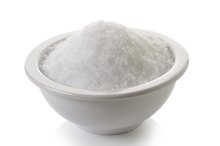What Are the Side Effects to the Tuberculin Test?
Tuberculin is a purified protein derivative used to determine whether or not a person has been exposed to a tuberculin protein (the bacteria that causes tuberculosis). The test is administered to determine if the individual already has antibodies to the tuberculosis bacterium, either through previous injection or from environmental factors. As is the case with most bacterial tests, there are some side effects associated with use.
If you are experiencing serious medical symptoms, seek emergency treatment immediately.
Common Side Effects
As mentioned, there are certain side effects associated with using this test. These include:
- pain at the injection site
- headache
- nausea
- rash
- itching
- fever
- dizziness
- drowsiness
- general feeling of illness
- vomiting
- diarrhea
While these are considered the most common side effects associated with using this test, they affect only a small number of users.
Severe Side Effects
Neo Citran Side Effects
Learn More
Unfortunately, there are also unlikely but possible severe side effects associated with taking this test. These side effects are very rare.
Important Safety Information
This test should not be administered if you are pregnant or breastfeeding, as the chemicals present during the injection can have a negative effect on an unborn or newborn baby. Itching, irritation, and swelling at the site of injection is a normal reaction. If you are allergic to any type of food or medication, inform your doctor prior to the injection to determine if it is safe for you.
- This test should not be administered if you are pregnant or breastfeeding, as the chemicals present during the injection can have a negative effect on an unborn or newborn baby.
- If you are allergic to any type of food or medication, inform your doctor prior to the injection to determine if it is safe for you.
Use
What Drugs Are Tested for in a Urinalysis?
Learn More
The tuberculin test is administered in injection form and should be performed by a medical professional in a medical setting 1. The test is injected into the forearm of the individual and will produce a wheel-like rash at the spot of injection. Once this has occurred, you will be asked to return to the doctor after 72 hours to determine the results. The results are determined according to the irritation present after the 72 hours has passed.
- The tuberculin test is administered in injection form and should be performed by a medical professional in a medical setting 1.
- The test is injected into the forearm of the individual and will produce a wheel-like rash at the spot of injection.
Warning
If you experience any of the above side effects, contact your doctor immediately.
If an overdose is suspected, contact the poison control center and head directly to the nearest emergency room.
The tuberculin test is meant to test for tuberculosis only and should never be used for any other medical purpose or without the consent of a doctor 1.
Related Articles
References
- Tuberculin Test Information
- Pirahanchi Y, Jialal I. Physiology, thyroid stimulating hormone (TSH). Treasure Island, FL. StatPearls Publishing. Updated April 25, 2019.
- Endocrineweb. Thyroid gland: Overview. Updated March 26, 2019.
- Merck Manual Professional Version. Hypothyroidism (myxedema). Updated May 2019.
- Doi SA, Issac D, Abalkhail S, Al-qudhaiby MM, Hafez MF, Al-shoumer KA. TRH stimulation when basal TSH is within the normal range: is there "sub-biochemical" hypothyroidism?. Clin Med Res. 2007;5(3):145-8. doi:10.3121/cmr.2007.756
- Yavuz S, Linderman JD, Smith S, Zhao X, Pucino F, Celi FS. The dynamic pituitary response to escalating-dose TRH stimulation test in hypothyroid patients treated with liothyronine or levothyroxine replacement therapy. J Clin Endocrinol Metab. 2013;98(5):E862-6. doi:10.1210/jc.2012-4196
- Drugs.com. Thyrotropin releasing hormone TRH. Updated May 22, 2019.
- Wang HF, Huang CC, Chen YF, Ho DM, Lin HD. Pituitary apoplexy after thyrotropin-releasing hormone stimulation test in a patient with pituitary macroadenoma. J Chin Med Assoc. 2007;70(9):392–395. doi:10.1016/S1726-4901(08)70026-1
- Altıncık A, Demir K, Çatlı G, Abacı A, Böber E. The Role of Thyrotropin-Releasing Hormone Stimulation Test in Management of Hyperthyrotropinemia in Infants. J Clin Res Pediatr Endocrinol. 2015 Sep;7(3):211-6. doi: 10.4274/jcrpe.1985.
- Pijnacker T, Knies M, Galac S, Sanders K, Mol JA, Kooistra HS. TRH-induced secretion of adrenocorticotropin and cortisol in dogs with pituitary-dependent hypercortisolism. Vet Q. 2018 Dec;38(1):72-78. doi: 10.1080/01652176.2018.1521537.
- Rijks J, Penders B, Dorenbos E, Straetemans S, Gerver WJ, Vreugdenhil A. Pituitary response to thyrotropin releasing hormone in children with overweight and obesity. Sci Rep. 2016 Aug 3;6:31032. doi: 10.1038/srep31032.
Writer Bio
This article was written by the CareerTrend team, copy edited and fact checked through a multi-point auditing system, in efforts to ensure our readers only receive the best information. To submit your questions or ideas, or to simply learn more about CareerTrend, contact us [here](http://careertrend.com/about-us).









